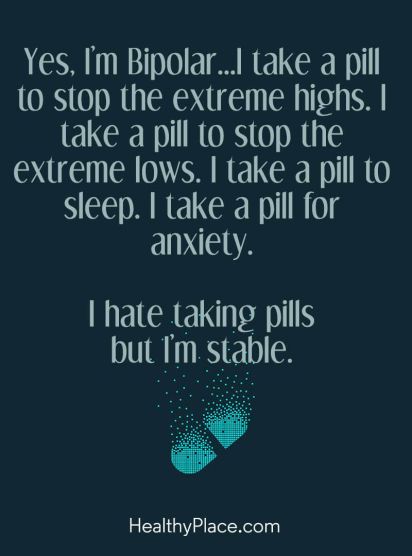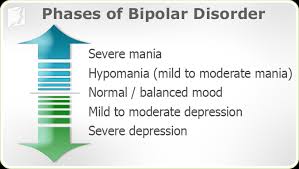
When most people think of bipolar disorder, they may think of the two opposing poles that make up the illness. High and low. Manic and depressed. Many also believe that all people with bipolar flit between these moods constantly and that the illness is severe or alike in everyone who has it. This is not the case.
There are two types of bipolar disorder. I have the first one – Bipolar affective One disorder, which means that I have serious manic episodes which include psychosis (loss of touch with reality). This has happened to me twice in my life and both times I have needed hospitalisation. Bipolar two is characterised by lesser manic episodes (hypomania) and more mixed states.

(image: https://www.34-menopause-symptoms.com/mood-swings.htm)
Being Bipolar One is very challenging. When I get ill, I get really really sick. Loss of insight, loss of reality, needing anti psychotic medicines now- ill. Ill to the point of being sectioned under the mental health act due to lack judgement and insight. Believing that my family are out to get me and people are going to harm me – ill. Really unwell.
When one of these serious manic episodes strikes for me, my thoughts begin racing and I can’t concentrate. I don’t sleep, I am more creative in the short term but a gibbering wreck in the long term. I start believing I can do things that I can’t rationally. I am super vulnerable and I speak much faster. I may not make much sense and when the delusions begin, I start believing I am going to be harmed.
Luckily, these episodes are kept at bay by a host of excellent medications including Lithium and Quetaipine. I also take anti depressants to keep the low periods at bay in my life.
Full blown psychosis and mania for me are very rare but they do happen. In 10 years, from 2004-2014 I did not have a hospitalisation. I was depressed and anxious but I was able to recover at home.
I had no hypomanic or manic episodes for a decade! No psychosis. One therapist even questioned my diagnosis, before my 2014 hospitalisation.
Mania for me means danger. That danger means I am more vulnerable. I have to be very careful who I surround myself with during those times. I don’t drink alcohol to excess or take drugs, but some with this kind of mania do. Or they spend lots of money or engage in risk taking behaviours such as sexual activity.
I have learnt that as long as I take my medication regularly, get enough sleep, eat well (and don’t engage in long haul travel) that I can keep my symptoms at bay. If my medicines work! (this is always a fear.. that they could stop working).
Mania for me strikes out of the blue sometimes. I also have to be careful that my mood stabiliser medicine is holding me- as with high doses of anti depressants, mania can be triggered without it.
When in psychosis in hospital I have thought the following untrue delusions
– I am being harmed by my family
– There are CCTV cameras watching and filming me in my bedroom/ hospital room
– I have been abused in some way (my mind convinces itself)
– I am being held by a criminal gang (in hospital)
These delusions have always disappeared over time, with excellent care from psychiatrists and psychologists, anti psychotic medicine and good support from family.
I don’t get these when well, and rarely have to go through them. I am learning to accept that my brain chemistry is not the same as other people and having bipolar, a chronic illness, is not my fault. I just do the best I can to manage symptoms and keep myself as well as possible.
If you want to share your story of mania and bipolar, please do write below.
There is hope and recovery after mania. Thank you to all on the Facebook group who voted for this one.
Love, Eleanor x

Thank you for sharing your experiences. I have BP2 with psychotic features. I’ve not been manic in a while since on medication, but I have experienced hypomania and there is a big difference for me. When manic, I didn’t need sleep, I was promiscuous (I’m married), I was super creative and thought I was so awesome. I also took part in other risky behavior such as drugs and gambling. Hypomania I get in blips. I get a tinge of energy (And if I want to do anything I’d better do it then, otherwise it will never get done) I don’t need sleep and I get talkative. I am able to contain myself and keep out of situations that can get me in trouble. I’m thankful that I have that. I also hallucinate. But I am able to discern reality from fantasy. I’ve never been hospitalized and I hope I can avoid that in the future.
LikeLiked by 1 person
Thanks Iggy for sharing your story. Its so important to talk about it.
LikeLike
I don’t have bp but I have ptsd and did, anxiety and depression, and I do get psychotic, or one of my alters does, she gets hallucinations, and we are on trevicta which is invega in a 3 monthly shot, to help with the psychosis. Psychosis can be very scary. I hate it. I totally get the being vulnerable part of it. I feel like that too. xoxo
LikeLiked by 1 person
Its so scary isnt it. Thanks for sharing your story with me
LikeLike
I’ve heard of bipolar symptoms but hearing someone actually talk about their experiences is eye opening. What a challenging journey it is!! But it’s great that you are knowledgeable and aware of what’s going on and how to keep yourself well. I have depression and panic attacks and it’s hard to explain. They’re not obvious. Mental health is tough in itself but even harder when people don’t get it.
Thanks for your insights and your work in promoting awareness.
LikeLiked by 1 person
Thanks so much
LikeLike
Thank you SO much for sharing these experiences. They have been so very helpful ! I know that sound weird to thank you but it helps me understand and I need to understand
LikeLiked by 1 person
That means the world. Thanks x
LikeLiked by 1 person
I also have bipolar disorder type 1. You make a great point that experiences vary, even within types. I’m glad that you emphasized that mania is not always pleasant. When I’ve been psychotic, I often have delusions of persecution. I lack insight when manic. Sometimes I barely remember the experiences, but when I have I was in no shape to be among other people, and was not always safe to myself. I often scared people.
Luckily I haven’t been full blown manic for a while now. My current medication mix is good. A little better at preventing mania than depression, but my depressions lately could have been longer/worse. They have been more situational than results of fall from mania.
LikeLiked by 1 person
Thanks for sharing :). It sounds like our illnesses are similar
LikeLiked by 1 person
I thought so, too. All the best!
LikeLiked by 1 person
You too
LikeLiked by 1 person
I love that you realize that it isn’t your fault. You have a good handle on understanding yourself.
LikeLiked by 1 person
It took many years of therapy to get here 🙂
LikeLike
I get it. Congratulations to you for putting in the years of work. I wish you further success as you go on.
LikeLiked by 1 person
Thank you
LikeLike
Bipolar difficulties can be very tough to deal with when going through life each day.
LikeLiked by 1 person
Indeed
LikeLike
Someone close to me has type 1 bipolar. The sad part is the refusal to acknowledge it which makes it more challenging for the other family members. I think there is a sense of shame that makes a person try to hide their diagnosis.
LikeLiked by 1 person
Im sorry to hear that. There is a sense of shame definitely. For me, I accepted it fairly early on because it was clear how ill I was getting and I wanted to feel better.
LikeLiked by 1 person
Yep some of these symptoms sound familiar! I was diagnosed with schizophrenia 13 years ago and lived in a state of psychosis for about three years! Seems like a life-time ago xx
LikeLiked by 1 person
Hi new friend. Its so hard isnt it!
LikeLiked by 1 person
That it is lol.. a million times that!!
LikeLiked by 1 person
Yes!
LikeLike